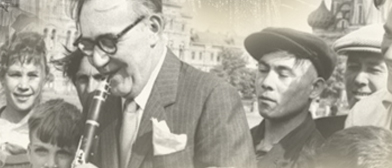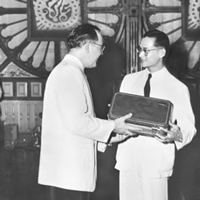
Presenting a clarinet to King Bhumibol Adulyadej. Bangkok, Thailand, 1956
The Thai King, an accomplished jazz saxophonist, clarinetist, and trumpeter, was delighted to play with Goodman. They further cemented their musical friendship in 1960 when the sovereign visited Manhattan – jamming with Benny during
a rooftop party at the band leader’s home.
Courtesy of the Irving S. Gilmore Music Library, Benny Goodman Papers, Yale University. |
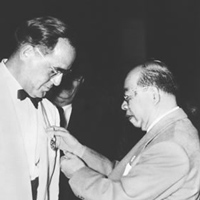
Receiving the rank of Chevalier in the Royal Order of Monisaraphon from King Norodom Suramarit. Phnom Penh, Cambodia, 1956
Among the many awards he received during this tour, Goodman was appointed honorary traffic commissioner of Bangkok, ceremonial governor of Kuala Lumpur, and ex-officio fire chief of Singapore.
Courtesy of the Irving S. Gilmore Music Library, Benny Goodman Papers, Yale University. |
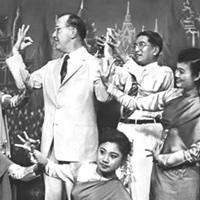
Bangkok, Thailand, 1956
Goodman, accomplished in both classical music and the jazz idiom, often delighted in the juxtaposition of traditional and modern forms. In this photograph Benny gives his own twist to the adage that imitation is the highest form of flattery.
Courtesy of the Irving S. Gilmore Music Library, Benny Goodman Papers, Yale University. |
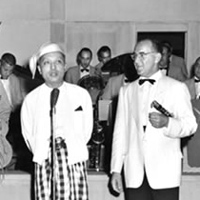
Rangoon, Burma, 1957
In a meeting that included the musicians and local leaders, Goodman enjoyed the company of this eminent Burmese public figure who would later serve as Secretary-General of the United Nations.
Courtesy of the Irving S. Gilmore Music Library, Benny Goodman Papers, Yale University. |
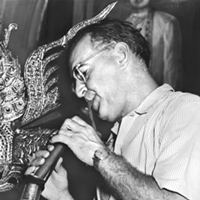
Rangoon, Burma, 1957
The band leader and his orchestra spread goodwill as they expressed a fascination with local music in formal concerts, spontaneous jam sessions, and outings to nightclubs.
Courtesy of the Irving S. Gilmore Music Library, Benny Goodman Papers, Yale University. |
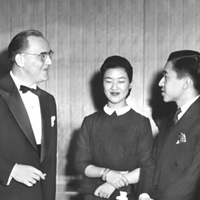
Tokyo, Japan, 1957
Goodman’s visit to Asia may have featured more meetings between musicians and royalty than all the other tours combined. His skills as a cultural diplomat convinced organizers in Washington, DC of the value of the jazz program as an outreach tool.
Courtesy of the Irving S. Gilmore Music Library, Benny Goodman Papers, Yale University. |
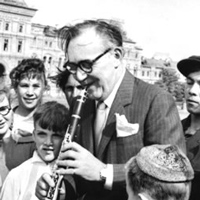
Moscow, Soviet Union, 1962
When Goodman saw members of the Red Army marching toward Lenin’s Mausoleum, he couldn’t resist breaking into a jazz version of Pop Goes the Weasel – keeping time with the rhythm of the soldiers’ boots. For the children in this photo, the King of Swing became the “Pied Piper” of Moscow.
Courtesy of the Irving S. Gilmore Music Library, Benny Goodman Papers, Yale University. |
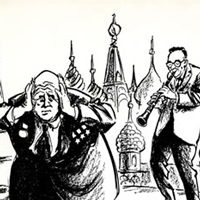
Bill Mauldin cartoon satirizing Goodman’s encounter with Soviet Premier Nikita Khrushchev. Moscow, Soviet Union, 1962
Premier Nikita Khrushchev attended the opening of the Goodman Orchestra’s concert in Moscow, but maintained his opposition to jazz. The popularity of the American band’s visit, coupled with Cold War tensions following the Cuban Missile Crisis, led to a renewed Communist Party edict against this musical genre in the winter of 1963.
Copyright 1962 by Bill Mauldin. Courtesy of the Mauldin Estate. Courtesy of the Irving S. Gilmore Music Library, Benny Goodman Papers, Yale University. |
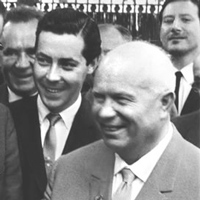
Meeting Khrushchev at the U.S. Embassy Fourth of July party. Pictured between Goodman and Khrushchev (L to R): John M. McSweeney, U.S. Chargé d’Affaires; unidentified man; Aleksei N. Kosygin, Soviet Deputy Premier; and Viktor Sukhodrev, Khrushchev’s interpreter. Moscow, Soviet Union, 1962
Premier Nikita Khrushchev attended the opening of the Goodman Orchestra’s concert in Moscow, but maintained his opposition to jazz. The popularity of the American band’s visit, coupled with Cold War tensions following the Cuban Missile Crisis, led to a renewed Communist Party edict against this musical genre in the winter of 1963.
Courtesy of the Irving S. Gilmore Music Library, Benny Goodman Papers, Yale University. Photograph by United Press International.
|
The Ambassador of Swing
Clarinetist Benny Goodman and his orchestra began their first State Department tour in late 1956, and performed in countries including Thailand, Burma, Cambodia, Malaya, Japan, Singapore, South Korea, and Hong Kong. The greatest diplomatic triumph of the trip came as he befriended and played with Thailand’s King Bhumibol Adulyadej, an accomplished jazz saxophonist, clarinetist, and trumpeter. The Thai King was elated to have the King of Swing join his regular jam sessions at the palace. With their warmth and deep interest in local music, Goodman and his band won over Bangkok audiences, and the New York Times reported that they established the “closest bonds of understanding” by making “a circuit of the nightclubs and dance halls, jamming with the local musicians.” Goodman also brought his diplomatic charm to meetings in Japan with Crown Prince Akihito and his siblings, and in Burma with U Thant, a future Secretary-General of the United Nations. U.S. government officials argued that the “tour strengthened the impression that America is not only great in modern plumbing and fancy cars, but in things of the spirit and the arts.”
In 1962 Goodman became the first jazz musician to tour the Soviet Union for the State Department, when he made thirty appearances in six cities during a five-week voyage. These occurred between the Berlin Crisis of 1961 and the Cuban Missile Crisis of 1962 at the height of Cold War tensions. Soviet Premier Nikita Khrushchev attended the band’s opening night in Moscow and was welcomed with Let’s Dance and Greetings Moscow, a number based on a Russian folk song. Khrushchev later sent Goodman a note reporting that he had been “very pleased and delighted to be at the concert.”
Although Soviet policy had long declared jazz a decadent modern art form, Goodman and his orchestra discovered thousands of underground and knowledgeable fans. Since Russian officials had banned the American musicians from fraternizing with ordinary citizens, band members Phil Woods and Zoot Sims made contact with enthusiasts who called out to them from behind trees and bushes as they walked through Moscow parks. For his part, Goodman surprised the Soviets with an impromptu solo clarinet performance in Red Square. The New York Times noted that he became a visiting “Pied Piper” for curious children who swarmed around him in the shadow of the Kremlin. When Benny saw a squad of soldiers marching stiffly by to relieve the guard at the Lenin Mausoleum, the temptation was too much for him and he broke into a rendition of Pop Goes the Weasel. He then “caught the rhythm of the passing boots and the King of Swing kept time with the Red Army.”
Leningrad was the undisputed high point of the Goodman tour. Phil Woods befriended a local saxophonist and a pianist, starting an international jam session. On opening night at the Winter Stadium the band played forty minutes of encores. For the final concert the audience remained after the last song, cheering and demanding more music. Over an hour after the performance ended, Goodman came on stage in a sweater and slacks and played a solo.

